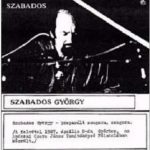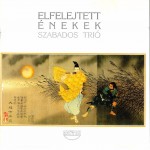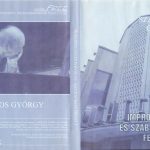– COMPOSITIONS –
 Szól a figemadár
Szól a figemadár
 You hear the Fig-Bird singing
You hear the Fig-Bird singing
 Der Fitisvogel singt
Der Fitisvogel singt
Year of writing:
First known performance:
Recording Date: April 20, 1980
Recorded at: live in Nagykanizsa 20.04.1980
Year of publishing:
1996
Music Publisher:
Fonó Records, Inc. Hungary
Note:
But that endless Canopy of Heavens…
………. Sounds might help. Music sounds in fact all the time because imprecation cannot reach music. Even the simplest man feels in his heart that music sounds, that a good music sounds, that something sounds nice, uplifting. Music is halfway not from this world. It is the voice of timelessness. Beautiful melodies won’t be born today and not even soon. Awkward, screaming, hoarse songs, sounds – these almost repulsive sounds tell about a lot of suffering. And then everything quiets down.
Because our heart will find again the long-forgotten perspective, which maybe could be called holy perspective. I think, this is the only worthy music, the holy music. Improvisation leads there today. What an incriminating word: improvisation – how libertine, how tinsel, how it had been prohibited for a long time for musicians, and how it spreads today and really, when man dares to express himself free from any prescription, any rule, simply and perhaps happily, to use the language of music, to convey a message with music – then there is a chance for harmony.
Like an ancient sage or a faithful child, improvizative music would like to bring up from the deepness these unforgettable sounds.
And to make it into music, like a child’s drawing, into transparent, beautiful music, lacking laureateship, void of representation, of power – and if there is power because finally there is always power, it must be the divine power expressing itself through us, because it is ego-forgetting, it is good, it is beautiful.
-Then the fig-bird starts talking?
-Don’t be afraid. That sound you heard was the NIGHTINGALE
The lark sings in the morning, the nightingale sings at night.
Nightingale, not the lark. – says Shakespeare in Romeo and Juliet. Don’t be afraid, night is not over. It is not so easy to step out of darkness. This darkness has a great weight.
– That is why the fig-bird sings.
– Reánk szakadt ez a sötét.
………… Talán a hangok segítenek. A zene valójában mindig szól, mert a zenét valójában nem éri el a rontás. A legegyügyűbb ember is érzi, a szívén érzi, hogy zene szól, hogy jó zene szól, hogy valami szépen hangzik, megemelően hangzik.
Félig nem evilági dolog a zene. Az időtlenség hangja. Szép dallamok ma és egyhamar nem fognak születni. Kínos, sikoltozó, berekedt énekek, hangzások, sok szenvedésről szólnak ezek a majdhogynem taszító hangzatok. Aztán majd megnyugszik a dolog.
Mert szívünk visszatalál ahhoz a rég elfeledett szemlélethez, amit talán szent szemléletnek lehetne nevezni. Azt hiszem, csak ez az egyetlen méltó zene, a szent zene. A rögtönzés az, ami ma erre vezet. Milyen gyanús szó ez, hogy rögtönzés, milyen szabados, milyen talmi, hogy tiltották hosszú időn át a zenészeket ettől és hogy hódit manapság és tényleg, ha mer az ember minden előírás, minden szabály, minden elvárt hangzás nélkül egyszerűen és talán boldogan szólni, zeneileg beszélni, zenével üzenni, akkor van esély a harmóniára.
Improvizatív zene, valami talán ősbölcs, hű gyermek módjára szeretné ezeket a felejthetetlen hangokat, a mélyből újra felhozni.
És bármi kis gyermekrajz módon zenévé tenni, áttetsző szép zenékké, amin nincs kitüntetettség, nincs képviselet, nincs hatalom, és ha van, mert mindig van végül is, akkor az a rajtunk át megszólaló Isteni hatalom legyen, mert az önfeledt, mert az jó, mert az szép.
– Akkor megszólal a figemadár?
– Ne félj szerelmem, még nem a pacsirta szól, mondja Shakespeare a Romeo és Júliában. Nem kell félni, még marad a sötét. Nem olyan könnyű kilépni a sötétből. Nagy a súlya ennek a sötétségnek.
– Azért szól a katonára a figemadár.
Aber dieser unendliche Himmelsbaldachin
…………….. Vielleicht helfen die Klänge. Musik erklingt eigentlich immer, weil bösartige Machenschaften Musik nicht wirklich erreichen. Auch der einfältigste Mensch fühlt, das etwas schön, etwas erhaben klingt.
Musik ist zur Hälfte nicht von dieser Welt. Sie ist eine Stimme der Zeitlosigkeit. Schöne Melodien werden heutzutage nicht geboren und auch nicht in naher Zukunft. Peinliche, kreischende, heisere Lieder, Klänge – diese meist abstoßenden Klänge geben von einer Menge Leid kund. Und danach wird sich wieder alles beruhigen.
Weil unser Herz die lang vergessene Sehensweise wiederfindet, die wir vielleicht als “heilige Sichtweise” bezeichnen könnten. Ich glaube, das ist die einzig würdige Musik, die “heilige Musik”. Improvisation führt uns heute in diese Richtung. Improvisation – welch ein verleumdetes Wort – wie liederlich, wie flatterhaft, was für die Musiker für eine lange Zeit verboten war – und wie sie sich heute ausbreitet, und wirklich, wenn der Mensch es wagt, sich selbst auszudrücken, frei von jeder Vorschrift, jeder Regel, einfach vielleicht beglückt, die Musik als Sprache einsetzen zu können, mit Musik Botschaften zu übertragen – dann gibt es eine Chance für Harmonie.
Die improvisative Musik möchte, wie vielleicht ein alter weiser Mann, oder wie ein treues Kind, dieses unvergesslichen Klänge wieder aus der Tiefe hinaufbefördern.
Und diese – wie bei einer Kinderzeichnung – , zur Musik machen, zu durchsichtiger, wundersamer Musik, ohne Auszeichnung, frei von Verwertung, ohne Macht – und wenn doch, da Macht schlussendlich immer da ist, muss es die göttliche Kraft selbst sein, die sich durch uns ausdrückt, weil diese selbstvergessen, weil diese gut ist, weil diese schön ist.
– Und dann beginnt der Fitisvogel zu singen?
– Der Tag ist noch nicht nah. Die Lerche singt am Morgen. Die Nachtigall singt in der Nacht. Es war die Nachtigall, und nicht die Lerche sagt Shakespeare in “Romeo und Julia”. Fürchte dich nicht – es bleibt noch eine Weile Nacht. Es ist nicht so leicht, der Dunkelheit zu entkommen. Diese Dunkelheit lastet schwer.
– Deshalb erklingt der Fitisvogel.
Recording Date: 1994, October 8 – live at Jazz Haus Koppenhagen, (DK) / Time 9:50
![]() Szabados György – Dresch Mihály – Geröly Tamás Trio
Szabados György – Dresch Mihály – Geröly Tamás Trio
György Szabados (piano, voice)
Dresch Mihály (reeds)
Geröly Tamás Sándor (dr)
PLAYLIST:
read more infos about playlist: #1 8:19 Musicians Related items: #2: 7:50 Musicians: Related items: #3 11:34 Musicians Related items: #4 6:47 Musicians Related items: #5: 1:29 Musicians: Related items: #6: 8:55 Musicians Related items: #7 11:09 Musicians Related items: #8: 7:28 Musicians Related items: #9 8:15 Musicians Related items: #10 9:22 Musicians Related items: #11: 8:02 Musicians Related items: #12 10:16 Musicians Related items: #13 6:16 Musicians Related items: #14: 7:56 Musicians: Related items: #15: 9:06 Musicians: Related items: #16 10:13 Musicians: Related items: #17 5:09 Musicians: Related items: #18 4:33 Musicians Related items:
Recording Date: April 20, 1980
Recorded at: live in Nagykanizsa 20.04.1980
Szabados – Vajda – Faragó Trio:
Szabados György (piano)
Vajda Sándor (bass)
Faragó Antal (dr)
![]()
![]() 1980: Szabados Trió – Nagykanizsa, 1980.
1980: Szabados Trió – Nagykanizsa, 1980.
![]() Review and picture from this concert published in Jazz Forum no. 66/1980
Review and picture from this concert published in Jazz Forum no. 66/1980
——————————-
Rec. Date: April, 30. 1980
Recorded live at Kassak Klub, Budapest(HU)
Szabados György (piano)
![]()
![]() Szabados szóló – Kassák Klub, 1980.
Szabados szóló – Kassák Klub, 1980.
———————-
Recording Date: November 8, 1980
Recorded at: M Studio, Novi Sad, Yugoslavia
Szabados – Vajda – Faragó Trio:
Szabados György (piano)
Vajda Sándor (double bass)
Faragó Antal (drums)
![]()
![]() 1980: Szabados Trió – Újvidék, 1980.
1980: Szabados Trió – Újvidék, 1980.
———————-
Recording Date: August 20, 1981
Recorded at: live at Vajdahunyadvár, Budapest (HU)
Szabados – Vajda – Faragó Trio:
György Szabados (piano)
Vajda Sándor (bass)
Faragó Antal (dr)
![]()
![]() 1981: Szabados Trió a Vajdahunyadvárban
1981: Szabados Trió a Vajdahunyadvárban
———————–
Recording Date: November 20, 1983
Recorded at: Partenstein (DE)
Szabados György (piano)
![]()
![]() Szabados – Koncert Partensteinben, 1983.
Szabados – Koncert Partensteinben, 1983.
——————————
Recording Date: 1985, ?? ??
Recorded at: Budapest (HU)
György Szabados & Mihály Dresch Duo:
Szabados György (piano)
Dresch Mihály (reeds)
![]()
![]() 1985: Szabados & Dresch – Budapest, 1985.
1985: Szabados & Dresch – Budapest, 1985.
———————–
Recording Date: March, 29 1985
Recorded at: Live at Rakparti Jazz Club, Budapest (HU)
Szabados György & Dresch Mihály Duo:
Szabados György (piano)
Dresch Mihály (reeds)
![]()
![]() 1985: Szabados & Dresch – Budapest, 1985.
1985: Szabados & Dresch – Budapest, 1985.
——————————————-
Recording Date: October 17, 1985
Recorded: Live in Vigadó, Budapest (HU)
Szabados György & Dresch Mihály Duo:
Szabados György (piano)
Dresch Mihály (b-cl)
![]() Video recording – Part I.
Video recording – Part I.
![]() Video recording – Part II.
Video recording – Part II.
————-
Recording Date: November, 27 1985
Recorded at: live in Szolnok (HU)
Szabados György (piano)
![]()
![]() 1985: Szabados szólóest Szolnokon, 1985.
1985: Szabados szólóest Szolnokon, 1985.
————————————–
Recording Date: June 1, 1986
Recorded at: „2. Daxberger Situationen”, Jazz Festival, Daxberg (DE)
György Szabados & Mihály Dresch Duo:
Szabados György (piano)
Dresch Mihály (reeds)
![]()
![]() 1986: Daxberger Situationen ’86 – Szabados & Dresch duó
1986: Daxberger Situationen ’86 – Szabados & Dresch duó
![]() Articles & Reviews
Articles & Reviews
![]() Poster
Poster
————–
Recording Date: April 8, 1987
Recorded at: “Apáczai Csere János TK Főiskola”, Győr, Hungary
Szabados György (piano)
![]() Audience recording
Audience recording ![]() CD 1
CD 1 ![]() CD 2
CD 2
![]() Concert was also filmed by Jenő Hartyándi, later released as “LOST FRAGMENTS 2” on “MEDIAWAVE Regional Film und TV Archives“
Concert was also filmed by Jenő Hartyándi, later released as “LOST FRAGMENTS 2” on “MEDIAWAVE Regional Film und TV Archives“
————————–
Recording Date: April, 25. 1987
Recorded at: Közgáz Jazz Klub, Budapest (HU)
Szabados György & Dresch Mihály Duo:
Szabados György (piano)
Dresch Mihály (reeds)
![]()
![]() 1987: MAKUZ a Közgáz Jazz Klubban, 1987.
1987: MAKUZ a Közgáz Jazz Klubban, 1987.
![]() Audience recording (only Szabados & Dresch Duo)
Audience recording (only Szabados & Dresch Duo)
——————
Recording Date: June, 21 1987
Recorded at: live in Szombathely (HU)
György Szabados & Mihály Dresch Duo:
Szabados György (piano)
Dresch Mihály (reeds)
![]()
![]() 1984; 1987: Szabados – Jirí Stivínnel / Dresch Mihállyal
1984; 1987: Szabados – Jirí Stivínnel / Dresch Mihállyal
——————–
Recording Date: October, 19. 1993
Recorded at: Petöfí Csarnok (Petöfí Hall) Budapest (HU)
György Szabados Trio
Szabados György (piano)
Dresch Mihály (reeds)
Geröly Tamás Sándor (dr, perc.)
![]()
![]() Szabados & Dresch & Geröly – Petőfi Csarnok, 1993.
Szabados & Dresch & Geröly – Petőfi Csarnok, 1993.
————————–
Recording Date: September 24, 1994,
Recorded at: Debrecen Jazz Days (Debreceni Jazz Napok) Debrecen (HU)
György Szabados Trio
Szabados György (piano)
Dresch Mihály (reeds)
Geröly Tamás Sándor (dr, perc.)
![]()
![]() Szabados & Dresch & Geröly Debrecenben, 1994.
Szabados & Dresch & Geröly Debrecenben, 1994.
————————-
Recording Date: October, 8. 1994
Recorded at: Jazz Haus Koppenhagen, (DK)
György Szabados Trio
Szabados György (piano, voice)
Dresch Mihály (reeds)
Geröly Tamás Sándor (dr, perc.)
![]()
![]()
![]()
![]() 1994: Elfelejtett énekek (Forgotten Songs)
1994: Elfelejtett énekek (Forgotten Songs)
—————————–
Recording Date: June, 29, 2003
Recorded at: Richter Terem, Győr (HU)
Szabados György (piano)
![]()
![]()
![]() 2003: I. Győri Improvizatív- és Szabadzenei Fesztivál, 2003-1 & 2
2003: I. Győri Improvizatív- és Szabadzenei Fesztivál, 2003-1 & 2
————————-
Recording Date: November 3, 2004
Recorded at: Stadtgarten, Köln (DE)
Szabados György (piano)
![]()
![]() 2004: Szabados szóló – Kölner Stadtgarten, 2004.
2004: Szabados szóló – Kölner Stadtgarten, 2004.
VIDEOS:
Recording Date: 1987, 8 April
Recorded at: “Apáczai Csere János TK Főiskola”, Győr, Hungary
Szabados György Solo
Szabados György (p)
excerpt from Video recording: György Szabados Solo – Live at TK Jazz Klub in Györ (HU) 08.04.1987 / LOST FRAGMENTS 2 – SZABADOS GYÖRGY (1987) – MEDIAWAVE
Year: 1987
Time: 7:45
Recording Date: 1987, 21 June
Recorded at: Improvizatív Zenei Tábor Képtár, Szombathely, Hungary
György Szabados – Mihály Dresch Duo
György Szabados (p)
Mihály Dresch Duo (reeds)
24:41 – 30:55: Szól a figemadár (You hear the Fig-Bird singing / Der Fitisvogel singt) 6:16
SHEET MUSIC:
Corrections and additions are welcome – please contact webmaster: info@györgy-szabados.com


